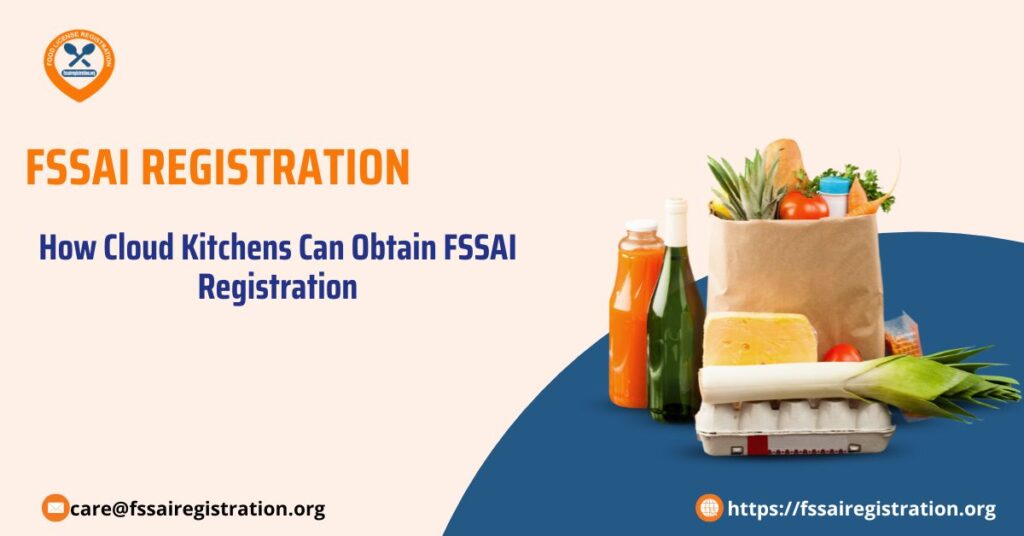Cloud kitchens, also known as ghost kitchens or virtual kitchens, are fast becoming a popular business model in the food industry. These kitchens operate without dine-in facilities and focus on preparing food for delivery. Despite their unique setup, cloud kitchens are required to adhere to food safety regulations in India, and obtaining an FSSAI registration is a mandatory step in this process. Here’s a comprehensive guide on how cloud kitchens can acquire FSSAI registration.
Understanding FSSAI Registration
FSSAI registration is a mandatory compliance for all food business operators in India, including small vendors, restaurants, food manufacturers, and cloud kitchens. It is governed by the Food Safety and Standards Act, of 2006, to ensure that food products meet safety and quality standards. This registration provides a unique 14-digit number that serves as proof of compliance and must be displayed on food packaging and premises.
For cloud kitchens, FSSAI registration not only fulfills a legal obligation but also builds consumer trust by assuring customers that the food served is safe and hygienic. It allows businesses to align with national food safety protocols, making them eligible for partnerships with leading food aggregators like Swiggy, Zomato, and Uber Eats. Moreover, FSSAI certification enhances market credibility and paves the way for expansion and innovation in the competitive food industry.
Why Do Cloud Kitchens Need FSSAI Registration?
- Legal Compliance: According to the 2006 Food Safety and Standards Act, FSSAI registration is mandatory.
- Building Trust: An FSSAI-registered cloud kitchen signals quality assurance and food safety to customers.
- Operational Advantages: Many online food delivery platforms require FSSAI registration to onboard restaurants or kitchens.
- Avoiding Penalties: Operating without FSSAI registration can result in fines, business closure, or even imprisonment.
Types of FSSAI Registration for Cloud Kitchens
FSSAI registration for cloud kitchens can be categorized into three types based on the scale of operations:
- Basic Registration: For small cloud kitchens with an annual turnover of up to ₹12 lakhs.
- State License: For medium-sized cloud kitchens with an annual turnover between ₹12 lakhs and ₹20 crores.
- Central License: For large cloud kitchens operating across multiple states or with an annual turnover over ₹20 crores.
Step-by-Step Guide to FSSAI Registration for Cloud Kitchens
- Application Submission: Accurately complete the application form and upload the necessary documents via the FSSAI portal. To begin the registration procedure, pay the applicable costs online.
- Application Verification: A designated official will review your application and verify the details provided.
- Facility Inspection: After submission, FSSAI representatives may inspect your premises to confirm adherence to hygiene and safety standards.
- Registration Certificate Issuance: Upon approval, you will be granted the FSSAI registration certificate, signifying that your business complies with food safety regulations.
Challenges and How to Overcome Them
- Complex Documentation: Preparing documents like the FSMS plan can be challenging. Templates and expert advice can help.
- Application Rejections: Rejections usually occur due to incorrect details or missing documents. Review your application thoroughly.
- Inspection Delays: Ensure your kitchen is inspection-ready to avoid unnecessary delays.
Benefits of FSSAI Registration for Cloud Kitchens
- Legal Recognition: FSSAI registration gives your cloud kitchen a legal identity.
- Customer Confidence: It helps build trust and attracts more customers.
- Business Expansion: Facilitates partnerships with delivery platforms like Swiggy and Zomato.
- Competitive Advantage: A registered cloud kitchen stands out in a competitive market.
- Facilitates Business Expansion: Having FSSAI registration makes it easier for cloud kitchens to expand into new markets, as it ensures compliance with food safety regulations across regions.
- Enables Product Innovation: FSSAI certification allows cloud kitchens to experiment with diverse food categories while maintaining safety and quality standards.
- Improved Vendor Relationships: Suppliers and vendors are more likely to collaborate with FSSAI-registered kitchens, ensuring access to high-quality raw materials.
- Simplifies Government Approvals: FSSAI registration streamlines the process of acquiring other necessary licenses or approvals for operating a food business.
- Boosts Digital Presence: Many food delivery platforms prioritize FSSAI-registered businesses, which can lead to better visibility and trust among customers ordering online.
- Access to Funding and Partnerships: FSSAI registration enhances credibility, making it easier for cloud kitchens to secure funding from investors and establish partnerships with larger food brands or franchises.
NOTE: To renew your FSSAI License, please click RENEW FOOD LICENSE CERTIFICATE
Conclusion
FSSAI registration is not just a legal necessity for cloud kitchens but a cornerstone of trust and credibility in the food industry. While the process may seem challenging due to documentation, compliance requirements, and inspections, overcoming these hurdles ensures long-term benefits such as customer trust, brand reputation, and business growth. By staying proactive, maintaining high food safety standards, and leveraging expert assistance when needed, cloud kitchens can seamlessly navigate the FSSAI registration process and establish a strong foundation for success in the competitive food delivery market. This compliance not only safeguards the business but also assures consumers of quality and safety in every meal served.

